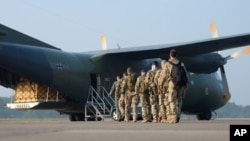The U.S. isn’t the only Western country sparing with Ankara over Turkey’s refusal to assist the Kurds fighting off Islamic militants in neighboring Syria. A senior ally of Germany's Chancellor Angela Merkel says the West shouldn’t rule out arming Turkey’s outlawed Kurdish separatists to help in the fight against jihadists.
Volker Kauder, the leader of Merkel’s Christian Democrats (CDU) in the German parliament, left open the possibility of Germany arming the banned Kurdistan Workers’ Party (PKK) as part of U.S.-led coalition efforts to defeat the Islamic State of Iraq and Levant (ISIL).
In an interview with Germany’s Spiegel magazine, Kauder, who is often referred to as Merkel’s “right-hand man,” said: “I know the problems that Turkey has with the PKK but to sit back and watch as ISIL takes important border towns and develops increasingly into a threat for global security cannot be the solution.”
Germany has been funneling arms to Kurdish Peshmerga forces in semi-autonomous Iraqi Kurdistan as part of its contribution to the U.S.-led coalition against Islamic State militants, who have seized, along with Sunni Muslim allies, a huge swath of Syria and Iraq.
The PKK is designated a terrorist organization by Turkey, the European Union and the United States. But before the crisis in Syria, and when Turkey and the PKK looked as though they were on course to conclude a peace deal to end the PKK’s 30-year-long self-rule insurgency in Turkey, some European governments, including Germany, discussed the possibility of removing the PKK from the EU’s list of terrorist organizations, say EU officials.
Kauder says any move to support the PKK, whose activists are fighting alongside Syrian Kurds in the besieged Syrian border town of Kobani, would have to be approved by Turkey.
“I do not rule out supporting other groups. But this would have to be done with Turkey, not against it. That also applies to support for the PKK,” Kauder said. “We should see that the greatest danger is the inhumane ISIS."
Turkish concerns
European diplomats here say Kauder’s caveat is unlikely to appease Turkish officials, already bristling at the West’s disapproval of its hands-off stance on Kobani. The plight of Kobani also has added to tensions between Washington and Ankara, which has declined to play any role so far in the U.S.-led military coalition against ISIL.
Overnight Monday, Turkish warplanes launched airstrikes on PKK fighters in a remote part of southeast Turkey for the first time since 2012 when peace talks started between Turkey’s Kurdish separatists and Ankara.
Turkey’s Prime Minister Ahmet Davutoglu told a news conference that the airstrikes were in response to “very serious harassing fire” by the PKK on a military outpost.
“Naturally it is impossible for us to tolerate this. Hence the Turkish armed forces took the necessary measures,” he said.
Last week, more than 30 people died in Turkey during Kurdish street protests against the government‘s decision to remain on the sidelines over the battle for Kobani.
PKK activists have warned that if Kobani falls to the Islamic State militants - the town's defenders are primarily fighters from a local PKK offshoot known as the YPG - then as far as they are concerned the peace process will be over.
The mere fact that Kauder has raised the possibility of arming the PKK is an expression of German frustration with Ankara’s inaction over Kobani, according to U.S. officials in Turkey, who have also urged the Turkish government to do more to assist Kobani’s Kurdish defenders in their month-long resistance.
No deal
Last weekend, U.S. officials thought they had the go-ahead from Ankara for U.S. and coalition forces to use the NATO air base at Incirlik in southern Turkey for airstrikes against Islamic militants. U.S. warplanes along with fighter jets from Saudi Arabia and the United Arab Emirates have been targeting jihadist positions in and around Kobani, trying to relieve pressure on the town’s Kurdish defenders.
But Turkish officials denied any deal on the use of Incirlik had been reached, saying negotiations are continuing.
PKK activists - along with U.N. officials - have been calling on Ankara to permit Kurdish volunteers from Turkey and elsewhere in Syria to relieve the flagging defenders. The Kurds accuse the Turkish government of seeing them as a greater danger than Islamic militants.
Some movement from Ankara on this front appeared to be in the offering, though, with Prime Minister Davutoğlu telling reporters late Wednesday that Syrian Kurdish fighters who had fled Kobani and were now in Turkey would be free to rejoin the battle.
Making a distinction
Asked if Turkey will open its borders for Kurdish volunteers to move into Kobani, he said, “Syrian Kurds can cross the Turkish border to fight against ISIL in Kobani.”
But he drew the line against Turkish Kurds.
“When it comes to Turkish citizens crossing into Syria, we cannot let them be a part of the fight there, no matter which side they will be fighting for,” Davutoğlu said.
Turkish security officials have been using facial recognition technology on the border to weed out any known PKK activists among refugees or YPG fighters who have fled Kobani, Turkish border sources say. Two wounded PPK members brought to Turkey for medical assistance were identified by the technology, according to Turkish media.
The Turkish government has agreed that Turkish territory can be used for the training of 2,000 moderate Syrian rebels, chosen by the U.S., to fight ISIL.
In meetings Thursday with senior Pentagon officials in Ankara, Turkish officials insisted that YPG forces shouldn’t receive any assistance, according to U.S. government sources who spoke with VOA.




